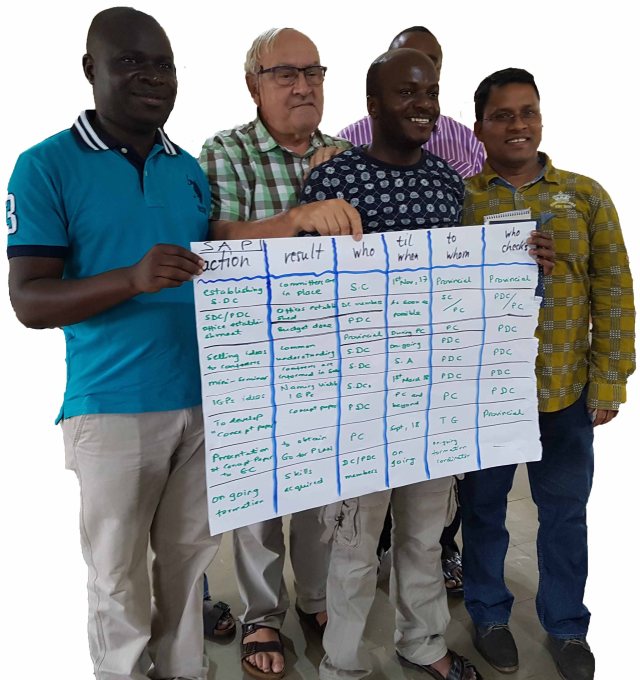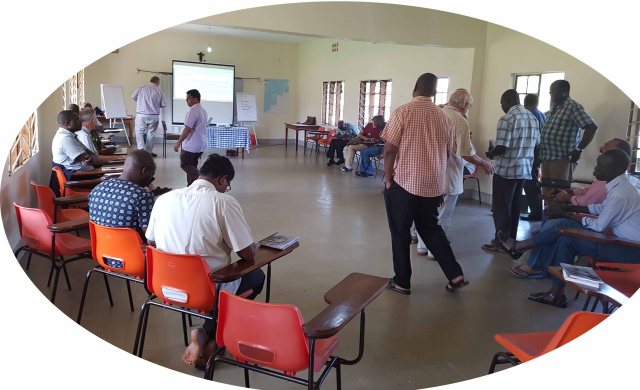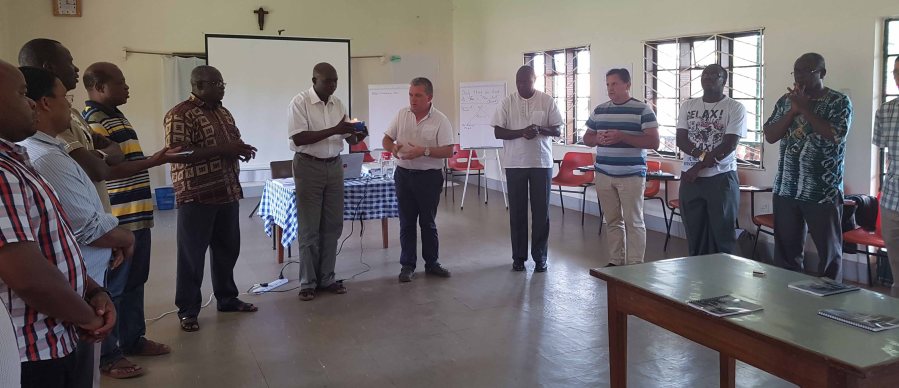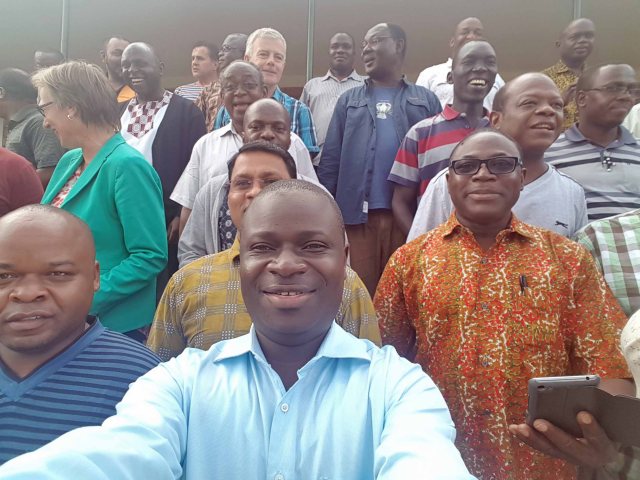I was asked to try and record in the form of an article what we have been going through here in Kampala, close to the place where young Kizito, Charles Lwanga and companions and Mapera were walking, praying, suffering and gave their life.
So, what to start with? The reality that we as a group of missionaries are slowly living on our reserves to survive? A bit like sheep in winter, having eaten all summer and having built up reserves the sheep will, to a large extent, live on these reserves in winter. Or that in quite a few communities we are able to take care of ourselves using the income produced by our various ministries? Or the initiative of raising rabbits in the community where I live (they do multiply as rabbits!! following a now famous quote). Or the last Chapter where our confrere capitulants raised the alarm on the fact that we need to ensure that we can continue our mission well into the future by becoming proactive in looking for resources and start Income Generating Projects (IPGs).
Our last Chapter charged the General Council to look into Income Generating Initiatives / Projects for the society. Not that nothing was ever done in this regard. We have had initiatives that were mainly centred in the Northern Hemisphere. More recently we have had some initiatives in Africa that operated on a trial and error basis, while some were quite successful. But more often than not the enthusiasm about starting such projects was high but was not matched by corresponding success rates. Hence the need for a more professional approach. Thus the calling into being of a team of confreres (mainly treasurers) who worked with experts in the field of Project Management for Income Generation Projects. They produced a book of guidelines to steer our Income Generation Projects on a more professional course. Using this resource book (Guidelines for ), about 20 of us coming from various Anglophone Provinces in Africa were ‘workshopped’ into the rather complex matter of the Income Generation Projects cycle, using the concrete example of construction of hostel.
The Three phased approach
We were taken through three different phases. They seem very logical and simple. Planning, Implementing of plans and operating the result of our effort: the planned building. In the diocese where I am now the Christians have decided to start a project to build a cathedral. They have decided to do it professionally. The workshop in Kampala has helped me to understand a bit better what it means to work professionally to construct a building as it did for all the participants.
Phase one
What is it that we are supposed to do? All together as missionaries of Africa we need to wake up to the fact that things are not the same as they used to be. At all times there seemed to be enough funding to do our work, to train our candidates, to venture into new missionary challenges. Well, that time is definitely finished. So all of us are asked to do the needful, like: budget, implement budgets, raise funds to meet the shortfalls, generally to live more according to our means.
So this common effort will underlie all of the other efforts for which the society has now put in place Development Committees, at the level of the Sectors and the Province, with, in the future, a coordinating office in Rome.
The Sector Council will appoint two members to the Sector Development Committee (SDC) to work with the confrere who is part of the provincial development committee and participated in the training. In order to help all of us in our Sectors to be part and parcel of this process, some mini seminars will be organized at the occasion of Sector Assemblies. This will assist in understanding the basics of managing IGPs and in finding some of the opportunities and potential ideas for IGPs. This will help the SDCs to identify some projects in their Sector. These should be developed up to a point where it will be clear that the eventual income is worth the investment. These committees will work on the following points:
- Is the idea sound, has it been tried elsewhere; how does it fit in with our lifestyle?
- What are the competitive advantages, its potential and uniqueness?
- What are the project goals?
- Who are the beneficiaries?
- Map out the stakeholders/ competitors/ operators.
- Point out the potential risks/ success factors.
- Included a rough draft of what it will cost.
The end result of this will be cast in the form of a Draft Concept Paper in which already some analysis is done and the project classification of the IGP is also determined. The Sector council will look at this concept, have its input and approve it to be sent to the Provincial Development Committee (PDC). There it will be examined and worked on further in order to send it to the Provincial Treasurer and Provincial Council. They in turn will examine the draft concept and after deliberation (with some possible modifications) approve it to be sent to the General Treasurer and the Financial Council in Rome. Once reviewed, it will go to the General Council. The General Council will be the one to either approve the concept or shelve/ archive it.
If approved
They will give it the “Go for Plan” signal. We are speaking about potential projects between 150 and 500 thousand Euro.
In depth planning
It will now be the task of the PDC to go deeper into the planning stage. The GC will release a small budget to assist in the planning because it will involve hiring the expertise needed to do a professional plan.
In the ‘Go for Plan’ stage the already gathered information will be further worked out and new documents will be added. One of the main ones is a Business Plan, which includes a market survey and financial projection. Ownership, administration, organization are mapped out. Risks are analysed. A detailed explanation of all this can be found in the new guidelines. All these preparations are done to give the PC, Treasurer General and his Financial Council and the GC all the tools they need to actually give the final go ahead or shelve it. As one can see little or nothing is left to chance.
The ‘Go / or No Go’
 First of all the decision will be published. If the project is approved a project team is setup. Accounts are created. A project structure is elaborated. A project manager may be appointed. (Sub)-Contractors will be found. Contracts will be negotiated. All this is then submitted to a thorough scrutiny which in the planning lingo is called a ‘quality gate’. If it passes here the project is now ready for Phase 2: the implementation stage.
First of all the decision will be published. If the project is approved a project team is setup. Accounts are created. A project structure is elaborated. A project manager may be appointed. (Sub)-Contractors will be found. Contracts will be negotiated. All this is then submitted to a thorough scrutiny which in the planning lingo is called a ‘quality gate’. If it passes here the project is now ready for Phase 2: the implementation stage.
If the decision is ‘no go’ all results are archived, all activities and accounts are closed. Documentation submitted to GC.
Phase two: the implementation stage
Most likely the Project Committee will now become the Management Committee. They are responsible to see to it that the Project Manager has all he needs. Legal experts may need to be involved. Risks need to be shared equally between contractors and MAFrs. Sub-contractors will agree to delivery dates, work out more concrete plans. Efforts are made to create a good understanding between all those involved so they communicate properly and at regular intervals.
It is now important to control the project. The actual versus planned status of the project is regularly worked out. This includes use of resources, use of budget. In all this the Project Manager, (Financial Manager, Quality and Risk Manager, if needed for the project) and the Project Management Committee divide the work.
Reporting up to the Treasurer General is required when the variance of actual expenditure with the budget exceeds 10 %. When the project has been finalised all accounts are closed.
The last ‘quality gate’ is the handover of the finished project (building, hostel, etc.) to the operator who has been identified already even in Phase 1.
This leads us to the Third Phase which is the operation of the project.
Phase Three: successful operation of the project
The final points that need attention are shared with the Operational Team. All documentation is also shared with them as well as technical know-how such as maintenance schedules and warranties. The Management Committee and the Operational Committee visit the site together and finally the handover can be done with some sort of celebration.
The Provincial Treasurer will now be in charge of supervising the operations but may delegate the Provincial Delegate or the Treasurer Delegate. Now on a yearly basis the operational profit will for 80% go to the province, while 20% will be saved for maintenance and repairs.
 Conclusion
Conclusion
The project journey has been painstakingly prepared, implemented and the success rate should be high. In other words our IGP guidelines are of a quality that should guarantee a good success rate. The future of our mission will in that way be better guaranteed than it is now. At the end of the workshop the participants in the workshop were still apprehensive about the complexity of the whole cycle, but did give their wholehearted approval to the process and started already to plan how to implement it in each Province.
In the place, which is steeped in history and tradition of the best kind, the place of martyrdom of the martyrs of Uganda, the same Society of Missionaries of Africa that brought father ‘Mapera’ to Uganda, started charting a new course to support the very same Mission that was crowned by the faith of the martyrs.


